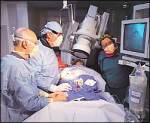Discusión cada vez mayor como doctores Train en los nuevos dispositivos
por
Michael Johns, Project Manager | August 04, 2006

Medical organizations and device
makers alike offer education
and training programs
As reported in the NY Times:
Last summer, rival cardiologists in Rock Hill, S.C., decided to learn how to perform a lucrative new procedure, implanting a defibrillator, a device that protects against fatal heart rhythms.
Dr. Paul G. Colavita of the Sanger Clinic says Biotronik is trying to tie implant training to device sales.
Piedmont Medical Center in Rock Hill, S.C., has set its own standards for implanting defibrillators.
One doctor attended weekend classroom sessions sponsored by a professional medical organization, passed a daylong written test given by that group and implanted defibrillators in 10 patients while an expert observed.
But by then, four other doctors at a competing practice had left him in the dust, implanting 75 devices. They chose a separate training program, provided free and tailored to their liking by a little-known device maker named Biotronik. Only one of the four doctors so far has taken the recommended daylong competency test. The training also apparently had unorthodox elements: two doctors sometimes trained together on one patient, a technique that experts called highly unusual.
The different training regimens like the ones followed by the Rock Hill physicians are at the center of a growing and often contentious debate. As companies develop more sophisticated devices like advanced pacemakers and carotid artery stents, medical experts are asking how doctors should best be trained -- and who should train them -- to implant such devices without compromising patient safety.
The growing use of the costly defibrillators is drawing particular attention. Until recently, such units were typically implanted by highly trained heart device specialists. But since last year, when the government agreed to pay for tens of thousands more patients annually to get such devices, many new practitioners like those in Rock Hill have entered the field. One result is that patients do not realize that the training and experience of doctors can vary widely.
"A patient does not know whether they are a doctor's third implant or their 300th," said Dr. Charles E. Swerdlow, a heart device expert in Los Angeles who advocates rigorous training standards.
To meet patient demand, the Heart Rhythm Society, a professional group that represents experts like Dr. Swerdlow, adopted so-called fast-track training guidelines two years ago for doctors who had not implanted defibrillators before. But those guidelines, of which the daylong written test is one part, are voluntary. No one knows what percentage of physicians who have recently begun to put in defibrillators are following the guidelines.
